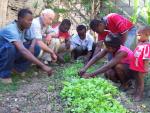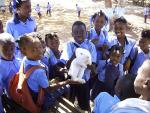Haitian Agribusiness Helping Families Produce Food in Cap Haitian

 Makouti Agro Enterprise is a locally-run business which provides agricultural services, inputs, and training, offering a means to increase food production in a locally sustainable manner. The agribusiness has grown to offer microcredit, labeling, quality control, and more, all the while retaining its community focus. Makouti’s exceptional growth can be attributed to their talented, determined leadership and to the support of organizations such as Partners of the Americas.
Makouti Agro Enterprise is a locally-run business which provides agricultural services, inputs, and training, offering a means to increase food production in a locally sustainable manner. The agribusiness has grown to offer microcredit, labeling, quality control, and more, all the while retaining its community focus. Makouti’s exceptional growth can be attributed to their talented, determined leadership and to the support of organizations such as Partners of the Americas.
Partners’ Farmer to Farmer Program in Haiti helped Makouti become an officially-recognized producers’ cooperative and sends volunteer specialists in marketing, vegetable production, rabbit and goat production, cooperative development, and other areas. Other groups assist with special projects. For example, Friends of Haiti assists with community development projects in the Grand Boulage area of Haiti on a volunteer basis, providing equipment and organization for solar-powered ovens, water pumps, seed storage, and other projects which are run by local community committees and aim for financial sustainability.
Over the years, this unique partnership has allowed Makouti to establish a regular customer base at schools, restaurants, and hotels, while keeping a percentage of profits to cover administrative costs. Through Makouti, farmers are empowering themselves to increase their income and improve their lives, and members gain self-confidence and pride in their profession. In Grand Boulage, for example, men and women are trained and involved in composting, seedling cultivation, rabbit and goat production, and water provision. One woman in Grand Boulage – Nessda - has been a very successful new rabbit producer. She started with a pair and now has 13 rabbits, giving 2 back to the Centre Professionelle, which will then be distributed to other new producers.
 As Partners volunteer and veterinarian Myriam Kaplan-Pasternak reported: Everyone [in Grand Boulage] was excited to show me their rabbitsand discuss how things were going. No one had any written records, but could recite every detail on the history of each rabbit, including lineage, births, deaths and ages. There seemed to be no problem for people to remember when to put the nest box in which is often a problem for people with busy lives.
As Partners volunteer and veterinarian Myriam Kaplan-Pasternak reported: Everyone [in Grand Boulage] was excited to show me their rabbitsand discuss how things were going. No one had any written records, but could recite every detail on the history of each rabbit, including lineage, births, deaths and ages. There seemed to be no problem for people to remember when to put the nest box in which is often a problem for people with busy lives.
And according to Partners’ and Friends of Haiti volunteer John Malcheski:
POA and FOH are making a lot of progress in the Grand Boulage area and surrounding villages. There are a lot of things to do yet to get the Makouti model on a self-sustaining basis. . . [however now] we have a water pumping system that lifts much needed water in the dry seasons. The rabbits are growing and doing very well and are being expanded to many areas. Those that do it well are starting to sell rabbits and rabbit meat. The nursery is up and running, so the initial trees will hold soil from eroding and provide feed for animals.
In spite of this progress, the community members, like many Haitians, are struggling with rising food prices. Makouti is extending the microcredit repayment period, but further financial support is needed to involve more families in production activities. So far, over $1,000 has been raised to supply seeds, rabbits, trees, goats, and gardens along with the necessary training.
To see more photos, project details and updates, contact information, and to contribute to this project please visit the “Feeding Families” Global Giving project page. For further information, please contact Meghan Oliver at molivier@partners.net. Thanks!
Add new comment